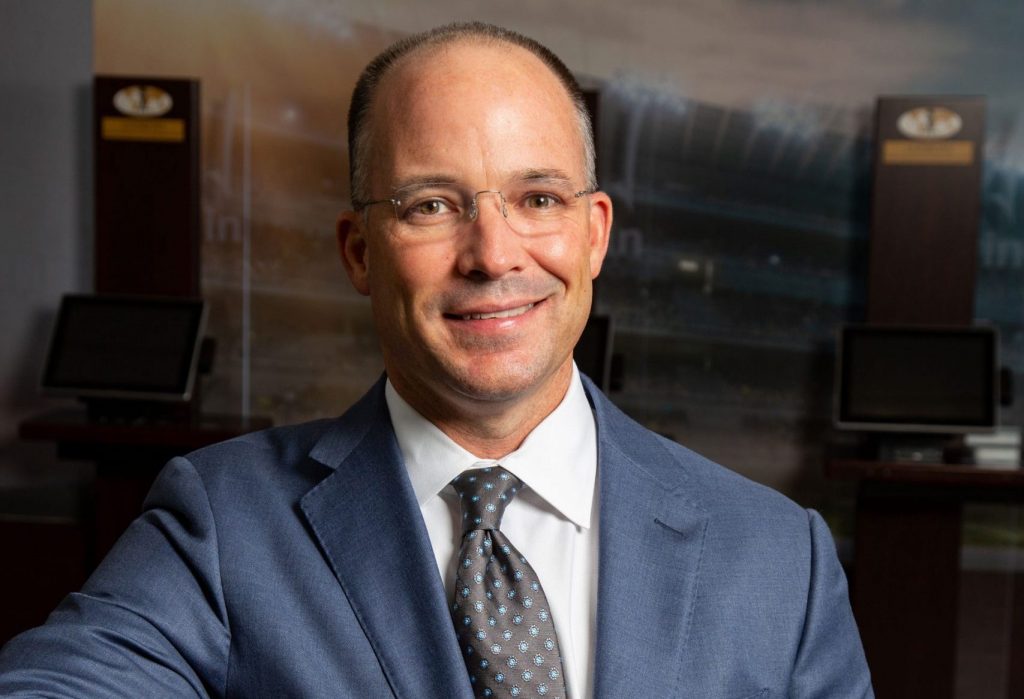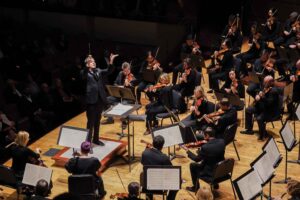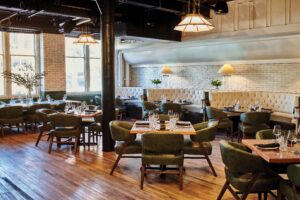Orthopedic surgeon Dr. Benton Emblom puts the lessons learned in his small-town youth in practice in the operating room and every other aspect of his life.
As a young boy growing up in Dothan, Benton Emblom learned the discipline, self confidence and physical skills that he would later employ in the operating room as a surgeon for one of the city’s premier orthopedic practices, Andrews Sports Medicine and Orthopedic Center. He specializes in sports medicine and arthroscopic treatment of the shoulder, elbow, hip and knee. He has sub-specialty expertise in hip preservation surgery and hip reconstruction.
“It all started with my mother’s father. He gave me my first hammer and tool belt when I was 4 years old. With that, we built a tree house from the ground up…pictures to prove it. He told me then…’if you want to assure that something is done right, do it yourself.’ With that mindset, relative to that tree house, we knew exactly how the pilings of the house were stabilized into the ground, how the load bearing beams of the house were secured, and how the flooring, railing, and steps were constructed in order to maximize stability and safety. Zero uncertainty. Having that mindset as a young child coupled with later lessons learned developed the “renaissance” mentality that I learned to live by,” Dr. Emblom says.
“The ‘if you want something done right, do it yourself’ mentality instilled in me by my grandfather is ultimately what led me into medicine, particularly orthopaedic surgery. Early on I wanted to go into engineering because of the triad of being given a problem or challenge, develop a solution to that problem or challenge, and execute the solution. However, I realized early on that engineers we not commonly given the opportunity to execute the solution in a hands on way, it was delegated to a team that had boots on the ground to complete. That was a critical cog in the wheel for what I wanted to do, and I realized that orthopaedic surgery satisfied all three of those components of problem solving.”
A summa cum laude graduate of the University of Alabama, Dr. Emblom earned a bachelor’s degree in chemistry and mathematics. He received his medical degree from the University of Alabama School of Medicine and completed a residency in orthopaedic surgery at UAB Hospital. He then completed a one-year orthopaedic sports medicine fellowship with Dr. James Andrews at the American Sports Medicine Institute. Following that, he completed additional training in hip arthroscopy with Dr. Thomas Byrd in Nashville, which provided focused training in arthroscopic and mini-open hip preservation surgery. Dr. Emblom’s certification in robotics allows the most technologically advanced option for active individuals with arthritic conditions.
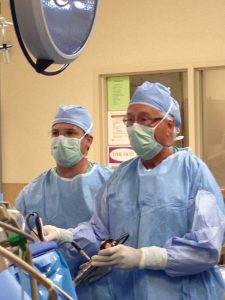 Dr. Emblom is a co-founder of the Andrews Hip Center of Excellence, and board member of the American Sports Medicine Institute (ASMI). He has also authored numerous research papers and book chapters on topics related to orthopaedics and sports medicine. Dr. Emblom actively performs clinical and biomechanical research at the American Sports Medicine Institute (ASMI).
Dr. Emblom is a co-founder of the Andrews Hip Center of Excellence, and board member of the American Sports Medicine Institute (ASMI). He has also authored numerous research papers and book chapters on topics related to orthopaedics and sports medicine. Dr. Emblom actively performs clinical and biomechanical research at the American Sports Medicine Institute (ASMI).
Emblom holds a special passion for the field of sports medicine because he participated in several team sports throughout his childhood. One aspect of sports he admires most are the goals that a team can accomplish together. As a team physician for Auburn University, the University of Alabama, Samford University, and Hoover High School, Dr. Emblom is able to passionately play an integral role on the team of accomplishing a shared goal: to foster player safety and to facilitate safe return to play after an injury.
“I was an assistant team physician at Alabama for eight years under Drs. Andrews and Cain. It was a great experience under Coach Saban and the Head Athletic Trainer Jeff Allen. I subsequently developed relationships with most all of the SEC athletic programs and have developed a role as a hip consultant for most of the conference. That has been an expansive experience that has allowed me to extend my reach to other programs. Dr. Andrews and the Auburn medical staff later asked me to join in helping them with sports medicine care four years ago. Transitioning between Alabama and Auburn has really personified my life growing up and my time with my wife, Anna. Her family and many of my close friends growing up spent time and have children at Auburn, and so this has given me the opportunity to represent Auburn in their presence, which has been very rewarding,” Emblom says.
“I was fortunate enough to have a very good father who provided good perspective and insight on how to appreciate things in life. Moreover, I had the good fortune of having a man named Jerry Speed as a second father figure. I started deer hunting with him when I was in seventh grade because my father did not deer hunt and that was something that I wanted to do. He had two daughters and I knew him through one of his daughters that was in my class growing up. He was a professional ‘Mr. Fix-it,’ literally. He repaired welding and steel fabricating equipment all over the Southeast. He was the consummate problem solver with no official education in engineering” he says.
“MacGyver is the personality and the mindset that defined me and what I wanted to be. Not to take anything away from what my father provided and taught me as a young boy and man, I feel like Mr. Speed molded my understanding of people from all walks of life, how to work well with people from all backgrounds and socioeconomic status, and how to learn from others in order to maximize my ability to do things for myself.
“I learned a lot about how to talk with others at a young age, treat them like I would like to be treated, and not judge by whatever background they came from. Once they learned that you perceived them in that way and were sincere, they would open up. Some of the most innovative people in the world are the guys in the fab shops with no formal education. They have to figure out how to make things work with only their imagination. I began to learn that in my experiences with Jerry. I learned to respect people for who they are, regardless of their education or lack thereof, because we all depend on each other. That is what makes the world go round.”
Whether he knew it or not, those early life experiences led Emblom to become a surgeon.
“Developing a self-reliant, problem solving, no looking back type of mindset at a young age allows me as a surgeon to go in confidently knowing there is no problem that I can’t’ fix once I commit to it. Being able to communicate that with a patient is just as important as doing the surgery. Speaking in simple and understandable terms, showing compassion in that they may not fully understand the situation, and getting on the same level mentally allows patients to be at ease with what’s at task. All those skills and personality traits were developed at a young age because of my experiences growing up in a small town, befriending people from all walks of life, and learning to be self-reliant and confident in myself that I can communicate with anyone, gain trust from anyone, and tackle any problem before me if I put my mind to it,” Emblom says.
Self-reliance and confidence are vital components to being a good doctor. “It is very important, particularly in surgery. Patients want and can detect a confident surgeon. That gives them a sense of optimism and their own level of confidence. Knowing and understanding the anatomy as a surgeon is similar to knowing and understanding the parts in a machine shop. With the appropriate tools and the ability to use those tools to safely craft a strong repair allows the surgical task to be completed. Once you step in the operating room self-reliance is critical, it’s now you as the surgeon and the injured patient that coexist. You don’t have anyone other than yourself to fix the problem at hand,” Emblom says.
“I’m an orthopaedic surgeon, which at the end of the day is not much different than carpentry, trim work, and fabrication. I started that when I was 4 years old. I held official employment as a carpenter when I was 15 years old and beyond. So, in terms of the physical skills and talents, being facile with power equipment and having a life of experience with such has allowed me to be technically very confident. Being a problem solver and using my hands and imagination to allow spatial understanding of structural systems enables successful surgical correction of problems. Having confidence in doing such is felt by the operating room staff as well as patients and puts everyone at ease, even in critical situations. Being able to get out of a jam in the operating room is much easier when the support staff either doesn’t ever realize it happened or has the utmost confidence that you as a surgeon can rectify the problem. Most importantly, being able to communicate and develop trust with patients is what allows me to do my job the best.”
Emblom transferred the focus required for successful outcomes in the operating room to the blue skies overhead when he became a pilot. His affinity for aviation grew out of his many hours on the water. He got his first boat when he was 10 and spent 2,500 hours on that boat between the age of 10 and 16. “Being on the water is one of my favorite pastimes and something that taught me a lot about control, weather, and navigation, which in turn developed into aviation.
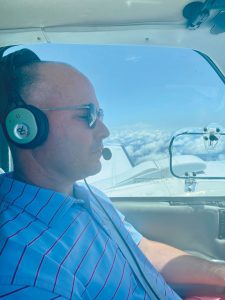 “I had a desire to fly since I was a kid. It just wasn’t something that my parents were very keen on, and I knew that and never pushed the issue. It was a timely coincidence that one of our fellows that trained with us back in 2012 had a father who was a flight instructor. He was local and was eager about taking me under his wing and training me to become a pilot. I immediately fell in love with aviation. It is the epitome of a mental-physical exercise. I fly because I love the conceptual intricacies of aerodynamics, mechanics, and electronics. Similar to but in the opposite direction than scuba diving (which there are some similar concepts with pressure, gases, fluids, etc.) Flying allows me to ascend from the world and immerse myself with the challenge of formulating a plan, interpreting information that comes suddenly before you, utilizing skills in mechanics and electronics to aerodynamically explore the world from an airborne perspective. You’re forced to learn about and understand weather, which is fascinating,” Emblom says.
“I had a desire to fly since I was a kid. It just wasn’t something that my parents were very keen on, and I knew that and never pushed the issue. It was a timely coincidence that one of our fellows that trained with us back in 2012 had a father who was a flight instructor. He was local and was eager about taking me under his wing and training me to become a pilot. I immediately fell in love with aviation. It is the epitome of a mental-physical exercise. I fly because I love the conceptual intricacies of aerodynamics, mechanics, and electronics. Similar to but in the opposite direction than scuba diving (which there are some similar concepts with pressure, gases, fluids, etc.) Flying allows me to ascend from the world and immerse myself with the challenge of formulating a plan, interpreting information that comes suddenly before you, utilizing skills in mechanics and electronics to aerodynamically explore the world from an airborne perspective. You’re forced to learn about and understand weather, which is fascinating,” Emblom says.
He started in a single engine plane and then moved straight into training for his instrument rating, followed by a multi-engine rating. He currently flies a twin engine Beechcraft Baron.
“Being a pilot really expands your footprint of personal exploration. My most memorable experience was traveling with my family to Great Exuma, Bahamas. We flew over the Atlantic Ocean and were able to see the entire chain of islands as we traveled into Exuma from Florida. Once we were there, we island hopped daily in the airplane, rented a small boat each day, and returned to Great Exuma in the evening. Something that would have been impossible without a plane. The mindset of self-reliance and confidence (but not overconfidence!) allowed me to master what is required to be a competent and safe pilot. Furthermore, my confidence level in what is required to be a safe pilot gave my family the confidence to travel in a small plane and explore places that would otherwise be hard to reach.”
From the skies to terra firma, Emblom has a deep abiding love for the outdoors and outdoor sports like hunting and fishing.
“Not only is hunting an exciting sport, but it teaches respect and understanding of the outdoors and wildlife, conservation, patience, and simplification (relative to the complex world we ordinarily live in). As a youth, it taught me how to communicate and develop relationships with adults, responsibility, and kept me out of trouble. Those are the things I want my children to know and learn, which is why it’s so important to me. I have a farm in south Montgomery County and manage it with the help of a good friend that lives on the property. I enjoy the year round tasks of property management, agriculture, and forestry. All those combined helps develop optimal wildlife habitat and improve property value. We build roads, maintain roads, bridges, and fords, develop food plots and plant orchards for food sources for deer, turkeys, and ducks. Being involved in that from a hands-on perspective is very satisfying and therapeutic for me. I really enjoy the fall and winter in the south as the weather is enjoyable. Cool crisp mornings and chilly afternoons allow quality time with family to teach the important things in life and allow quiet time to reflect on what is important and needs uninterrupted thought. I feel like I can get more done mentally on a cool fall afternoon in one hour in the woods than I can during an ordinary day in town,” says Emblom.
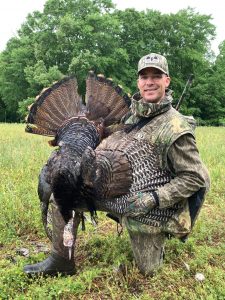 Sharing the outdoors with family is an important element in Emblom’s life. “We have 2 sets of twins, fraternal girls Ella and Camille, and identical boys Lawton and Haston. Ella is adventurous like me, enjoys the outdoors (whether its hunting or looking for snakes!), loves the beach and being on the water. Her talent since she was a 2-year-old was computers, graphics, and video. Camille is very routine focused, enjoys fitness and exercise, and also loves the beach. Her talent is tumbling and cheer. She’s been on a competitive cheer team since she was 9 years old, is a flyer, and wants to cheer in college. Lawton and Haston both love the outdoors, are very competitive when it comes to hunting and fishing. It’s always a competition between them, which can be good or bad! They both love golf and would play 7 days a week if possible. Being identical, they are somewhat symbiotic and don’t require much outside attention. Their goal is to play golf indefinitely and could live between the golf course and the woods.
Sharing the outdoors with family is an important element in Emblom’s life. “We have 2 sets of twins, fraternal girls Ella and Camille, and identical boys Lawton and Haston. Ella is adventurous like me, enjoys the outdoors (whether its hunting or looking for snakes!), loves the beach and being on the water. Her talent since she was a 2-year-old was computers, graphics, and video. Camille is very routine focused, enjoys fitness and exercise, and also loves the beach. Her talent is tumbling and cheer. She’s been on a competitive cheer team since she was 9 years old, is a flyer, and wants to cheer in college. Lawton and Haston both love the outdoors, are very competitive when it comes to hunting and fishing. It’s always a competition between them, which can be good or bad! They both love golf and would play 7 days a week if possible. Being identical, they are somewhat symbiotic and don’t require much outside attention. Their goal is to play golf indefinitely and could live between the golf course and the woods.
“My focus outside of work is my family. I’m an outgoing guy that considers myself friendly and a friend to all. However, I understand that my time with my family as a unit is limited and I try to spend as much time with them as I can. One of my goals in life is to be remembered not for what I accomplished or acquired, but how good of a person I was and the impact I had on my family and others.”
Emblom’s wife, Anna, is from Headland, and they met in high school. “We spent most of our high school years at sporting events, skiing at the lake, boating at the beach, visiting Auburn and Alabama. I attended Alabama and she went to Auburn. We were able to successfully maintain a distance relationship and got married after my first year of medical school. I consider her my best friend, and she knows my goals and understands my passion for the outdoors, flying, and adventure. She enjoys exercise and tennis. She is very task oriented and excels at anything that involves task development and completion, whether it’s exercise, tennis, travel, group planning, anything!
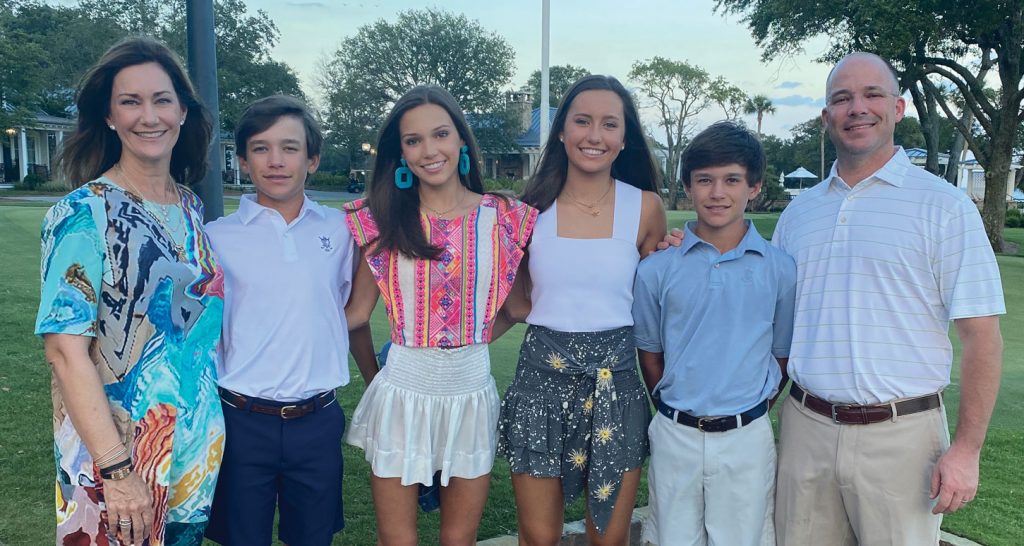
Emblom’s father is a retired dentist, his mother a retired schoolteacher. “He is a very simple person when it comes to possessions and need for material items, which taught me the value of conservation and appreciation of the fruits of our labors. My mother is the most well respected and coveted teacher that I’ve never had! I didn’t take any of her courses in school. However, students and parents of her students all rave about how good she is and her passion for teaching.” Emblom has sister, too, a life coach and spiritual psychologist in California.

